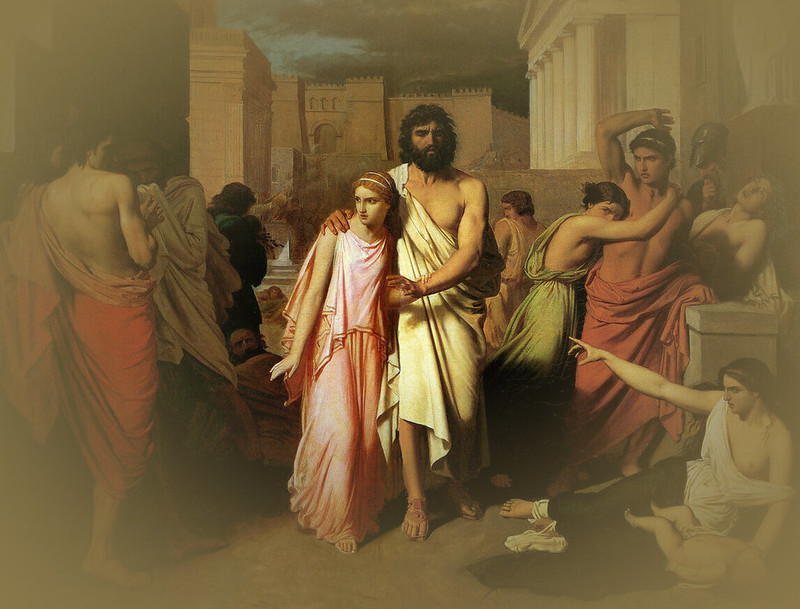Antigone

Antigone (in place of a mother) In Greek mythology, daughter of Oedipus and his mother, Jocasta (or Euryganeia); sister of Eteocles, Esmene, and Polynices. Antigone accompanied her blind father into exile in Attica, and after his death, she returned to Thebes. In defiance of her uncle Creon, she attempted to bury the body of her brother Polynices, which Creon had cast outside the walls of the city because Polynices had died trying to usurp his brother Eteocles’ throne. Creon sentenced her to be entombed alive.
Sophocles, in his play Antigone, pictures her as defiant in defending her ministrations to her dead brother. Sophocles has her say, “And what law of heaven have I transgressed? . . . if these things are pleasing to the gods [to be punished for ministering to her dead brother], when I have suffered my doom, I shall come to know my sin; but if the sin is with my judges, I could wish them no fuller measure of evil than they, on their part do wrongfully to me.” Antigone then hangs herself, while her betrothed, Haemon, the son of Creon, stabs himself beside her body.
In a variant myth Antigone and Argeia, the widow of Polynices, try to bury Polynices and are seized by Creon’s guards. They are handed over to Haemon for execution, but Haemon hides Antigone in a shepherd’s hut, and the two live together secretly for years. Antigone bears a son who, when he grows up, engages in some funeral games in Thebes and is recognized by a birthmark peculiar to the family. He is revealed to be the child of Antigone and Haemon, who were secretly among the spectators. Creon orders them put to death. To escape Creon’s vengeance, Haemon kills Antigone and himself.
In addition to Sophocles’ play, Antigone has inspired numerous others, including those of Cocteau, Anouilh, and Brecht. Cocteau’s play (1922) forms the basis for Honegger’s opera Antigone (1927). Carlos Chávez’s Symphony Number 1 (1933) is subtitled Sinfonia de Antigona and is based on incidental music to Cocteau’s version of Sophocles’ play. A German translation of Sophocles is used by Carl Orff for his “tragic play with music” Antigono (1948), and the earlier opera Antigono (1756) by Gluck uses an Italian translation of the Greek play.
SOURCE:
Encyclopedia of World Mythology and Legend, Third Edition – Written by Anthony S. Mercatante & James R. Dow– Copyright © 2009 by Anthony S. Mercatante